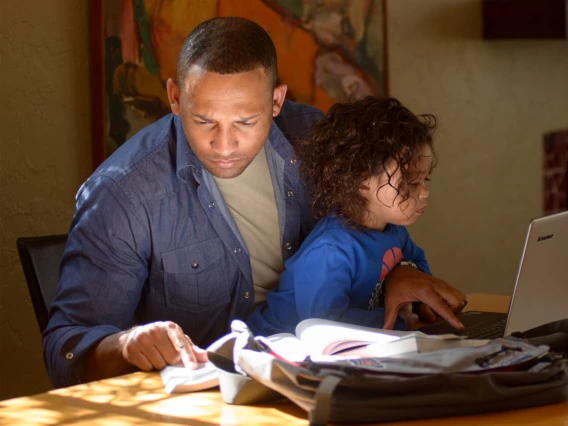Mild to Moderate Disabilities
Bachelor of Science in Special Education
Quick Facts

Top 5%
Online Bachelor's
Program in the Nation
- U.S. News & World Report, 2026
#1 in the
Southwest
Times Higher Education
- World University Rankings, 2026
As a teacher candidate, completing your undergraduate teacher preparation program K-12 degree in Mild to Moderate Disabilities qualifies you to support students with high-incidence disabilities in various settings. Through rigorous instruction in evidence-based, high-impact strategies and diverse field placement experiences, you will enhance the learning styles of students you interact with. Faculty and teacher candidates work together to create coaching and mentorship opportunities to develop each teacher candidates' teaching skills and abilities.
Courses are carefully designed to match the learner's needs with research-based practice and practical field-based application each semester. You will have the opportunity to take three semesters of field-based practicum experiences before the student teaching semester. Intensive coaching will be provided to you throughout your program.
Teachers with this degree emphasize supporting students with Specific Learning Disabilities, Emotional-Behavioral Disabilities, Intellectual Disabilities, Autism Spectrum Disorders, and Attention Deficit Disorders. Instructional delivery may occur across the continuum of services: inclusionary setting, co-teaching environments, self-contained classrooms, etc.
You must be an Arizona resident to enroll in the Mild to Moderate Disabilities program.
The program has additional admissions criteria. Please visit the College of Education Undergraduate Admissions page to read the professional admission information.
*Residents of some U.S. Territories may not be eligible. Please see our Eligibility & State Authorization page for more information.
This program consists of a three-semester sequence of coursework and culminates in a one-semester (60 day) supervised internship in an approved special education setting with a certified special education teacher. The curriculum for this program includes:
An introduction to historical, legal, pedagogical, and social issues underlying services in special education and rehabilitation. Provides an overview of the characteristics of persons with exceptionalities and disabilities as well as the services available.
Use behavior principles to positively support individuals with disabilities, especially those with moderate and severe disabilities.
This course is intended to aid teachers in dealing with responsibilities and concerns in school settings with regard to P.L. 94-142. Education for All Handicapped Children Act Section 504 of the Rehabilitation Act, Family Education Rights and Privacy Act, and other legal issues.
Learn the theories and history of programs for individuals with learning disabilities-definition, characteristics, etiology.
Assessment and instruction with an emphasis on formal assessment, informal assessment, diagnostic teaching, and implementation of individualized instructional programs.
Continuation of SERP 407A. This course is preparation for preservice educators to provide assessment and instruction for students with high incidence (learning and behavioral) disabilities.
Learn concepts, skills, and techniques to diagnose and assess students with learning and mild to moderate disabilities. This course builds on the first assessment course, teaching professionals additional evaluation tools, current brain research, and the knowledge required to address the assessment issues surrounding students with language and cultural differences. You will also learn how to synthesize, develop and write a comprehensive report.
Examine academic methods for teaching students with high incidence disabilities at the Secondary level. Focus on the acquisition of oral language, reading comprehension, written expression and math problem-solving strategies. Development and implementation of individualized educational programs and the use of evidence-based instructional methodologies are emphasized.
Familiarize yourself with physical and multiple impairments, etiology, intervention practices, adaptations, transferring and handling skills, and integration into typical environments.
Learn pragmatic, syntactic and semantic aspects of pre-linguistic and linguistic development in exceptional children and youth; cognitive and social bases of communication and language development.
Gain practical experiences with individuals having special needs with a focus on psychological, educational and service-related implications and practices.
Students enrolled in the program will be required to spend 35 hours during their practicum semesters (SERP 475) on-site, placed in a special education setting to gain observation and participation experience. This will also require coaching from a mentor teacher and university supervisor. This field placement must be done in-person.
Specialized work on an individual basis, consisting of training and practice in actual service in a technical, business, or governmental establishment.
This course emphasizes the theoretical understanding and practical application of collaboration, consultation, and teamwork implemented in settings for individuals with special needs. Develop skills and strategies needed to work with colleagues as co-educators.
Outcomes
Skills
Earning your Bachelor of Science in Special Education in Mild to Moderate Disabilities will build core skills, including:
- Providing high-impact instruction for students with diverse needs
- Conducting educational assessments
- Developing educational plans
- Creating behavior intervention plans
- Consulting with general education teachers
- Coordinating educational meetings
- Managing educational records
Potential Career Paths
Special education teachers of students with mild to moderate disabilities meet the needs of their students by engaging in a wide variety of responsibilities. Teachers with this degree emphasis will be supporting students with:











